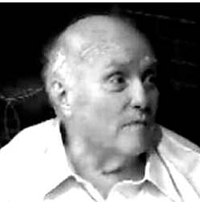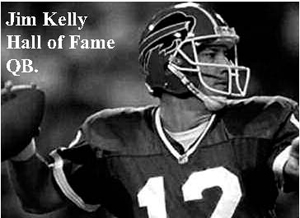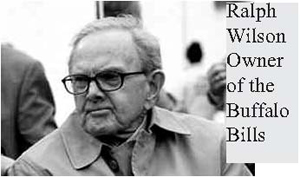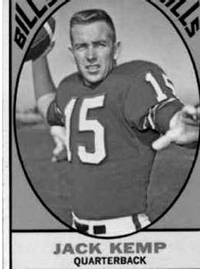Bills have had ups and downs . . .
... fans are big winners
By Jim Baker
 |
Jim Baker |
 |
 |
 |
Back in 1959, while I was a student at the University of Buffalo and a strong football fan, a group of wealthy entrepreneurs decided to risk starting a new football league to challenge the National Football League’s monopoly. They founded the American Football League and Ralph C. Wilson Jr. of Detroit, decided to place his franchise in Buffalo where the Bills exist today more than a half century later.
Buffalo emerged to become a thriving sports metropolis, where the Bills joined the NHL league Sabres, the minor league baseball Bisons and for a while the NBA Braves.
The Bills have experienced the ups and downs of fortunes— before and since joining the NFL via the merger of 1970. Their successes can be divided into eras led by Lou Saban, who coached the Bills to two AFL championships, and Marv Levy, who guided them to four consecutive Super Bowls, a feat unmatched by any team.
Successes of their stars can also be divided into distinct eras—Jack Kemp and Daryle Lamonica, keys to Saban’s first two title teams in 1964 and ’65 and then Jim Kelly, becoming the quarterback-engineer of those four Super Bowl teams with a passing arm that rewrote the team’s record book.
The magical exploits of Doug Flutie, and the record breaking accuracy of Drew Bledsoe—after being acquired from New England—continued the Bills winning tradition.
Through the years, the biggest winners have been the team’s loyal fans filling Ralph Wilson Stadium and before that Rich Stadium and War Memorial Stadium, with incredible enthusiasm. Though Buffalo and Western New York form far from the largest fan base in America, the team’s loyal followers have shown that the size of their hearts cannot be beaten!
Wilson, who had a minority interest in the Detroit Lions, announced on Oct. 17, 1959 that his fledging AFL franchise would be in Buffalo. Six weeks later he said his new team would be named “The Bills.”
The name was chosen in a contest back in 1946. The idea back then was to find a name for the All-America Conference team in Buffalo that would be distinguished from the minor league baseball and hockey “Bisons.” Several among the 4,500 entrants suggested The Bills, which won out over the “Bullets,” “Blue Devils,” and “Nickels.” James Dyson was selected winner of the contest after writing that legendary Indian scout Buffalo Bill Cody helped trail blaze the American frontier and the Bills would launch a new frontier in Buffalo sports.
Wilson, who in 2009, was inducted in the Football Hall of Fame in Canton, Ohio is the only original AFL owner to keep his team in its originating city.
Later, he played a major role in the AFL-NFL merger, being called the “Voice of Reason” among the owners.
Wilson’s Bills also won two AFL titles in 1964-’65, were the only AFL team to reach the post season in four consecutive years (1963-66) and were alone in winning four straight AFC titles (1990-93) and the first to appear in four straight Super Bowls.
Kemp was acquired in 1962 from San Diego for the low wager price of $100. He and Saban formed an outstanding combination in the AFL’s early years leading the Bills to consecutive league titles in 1964 and 1965.
Kemp, with an occasional affinity for gambling plays also had an intra-squad rivalry with Lamonica, a more flashy sort. The two triggered debates among Bills fans who was the better quarterback, the Steady Kemp or the Madbomber Lamonica.
The former Notre Dame star who arrived in Buffalo as the 24th pick of the 1963 draft, Kemp was the starter and fans loved it when Lamonica came off the bench to inject life into the offense often by long passes. Kemp-Lamonica debates raged until 1967 when Lamonica was traded to Oakland with wide receiver Glenn Bass for quarterback Tom Flores and wide receiver Art Powell plus draft choices. The trade is regarded as the worst in Bill’s history.
Kemp’s 42 yard pass to Bass set up the Bill’s scoring in the 20 to 7 victory over San Diego, Kemp’s former team, in the 1964 AFL title game. That game also featured such a jarring tackle by Mike Stratton that Chargers star running back Keith Lincoln was forced from the game with a broken rib. Kemp was a steady MVP and Bill’s fullback Cookie Gilchrist stared with 122 rushing yards. A year later in San Diego, the Chargers were heavily favored in the title rematch but the Bills prevailed 23 to 0 behind staunch defense and Kemp was voted MVP.
Kemp hit tight end Ernie Warlick for the games first TD before Butch Bryd’s 74 yard return produced another score and Pete Gogolak booted three field goals, from 11, 39 and 32 yards. Kemps’s last season was OJ Simpson’s first season in 1969.
Kemp was noted for reading historical books on chartered flights and later became a US Representative from the Buffalo area. He grew increasingly involved in governmental affairs, was an outspoken Congressman and in 1996 was Vice-Presidential candidate as Senator Robert Dole’s running mate against Bill Clinton and Al Gore. Kemp died at age 75 on May 2, 2009, barely a month after Saban passed away, age 87, March 29.
When Wilson announced in 2001 that quarterback Jim Kelly would be inducted into the team’s Wall of Fame, he added the surprise that Kelly’s number 12 would be the Bills first ever retired uniform number.
There were plenty of reasons for the dual honor: Kelly held virtually every Bills passing record; he led the team to four consecutive AFC championships and an unprecedented four straight Super Bowls. He made 5 pro bowl teams and is one of the NFL’s best quarterbacks in several categories.
Kelly showed considerable promise after emerging from the University of Miami in 1983 as one of that year’s legendary quarterback draft class that included John Elway and Dan Marino. After two years in the USFL, Kelly became 12th in NFL passing yardage (32,467), 12th in pass completions and 15th in touchdown aerial, 237. on Feb. 2, 2002 he made the Football Hall of Fame joining Marv Levy. his Bills’ coach and predecessor Billy Shaw (1999) and OJ Simpson (1985). Starring for the Bills from 1986 to 96, Kelly completed 60.1% of his passes and finished with 101 to 59 won-lost mark. Kelly repeatedly frustrated defenses with a no huddle offense. The Bills are remembered for losing four straight Super Bowls and almost forgotten is Kelly’s last drive, in their 20 to 19 loss to the Giants in Buffalo’s first Super Bowl. He started on the Bills 10 yard line with 2:16 left and engineered a 61 yards drive in 8 plays that set up Scott Norwood’s 47 yard field goal that went wide right ending the miracle hopes. Kelly was the 18th modern era quarterback that was selected to the Canton Hall of Fame and third University of Miami product enshrined, behind Ted Henricks and Jim Otto. Kelly was the 5th Hall of Famer to wear number 12 joining Terry Bradshaw, Bob Griese, Joe Namath and Roger Staubach. Kelly, of Pittsburg, was the 25th Pennsylvanian enshrined in Canton.
Marv Levy is a highly inspirational coach who amassed the best record of any Bills coach, tying Chicago Bears coach George Halas as the oldest active NFL pilot at age 72. Levy guided Buffalo teams that won four straight AFC titles and saw the same teams lose a record four straight Super Bowls from 1990 to 1993.
The point often missed by many is the tremendous drive and talent that is necessary to just appear in four straight Super Bowls. The Bills accomplished that under Levy and Kelly becoming the only team to do so. A little known fact is that Levy outperformed the winning-est coach in the NFL, Don Shula. Levy is the only coach to have a winning record against Shula 14 -6 in regular season and 3-0 in post season. Levy’s 154 triumphs is 10th in NFL history. He made five AFC title games winning four and his 11 post-season wins ranks him 5th in post season history.
A Chicago native and WW II veteran, he used historical examples to inspire the Bills, but corrected those who used war metaphors to describe football games. He’d tell them he fought in a war and there was no comparison. Of the Super Bowl, he declared, “This is not a must-win. World War II was a must-win!”